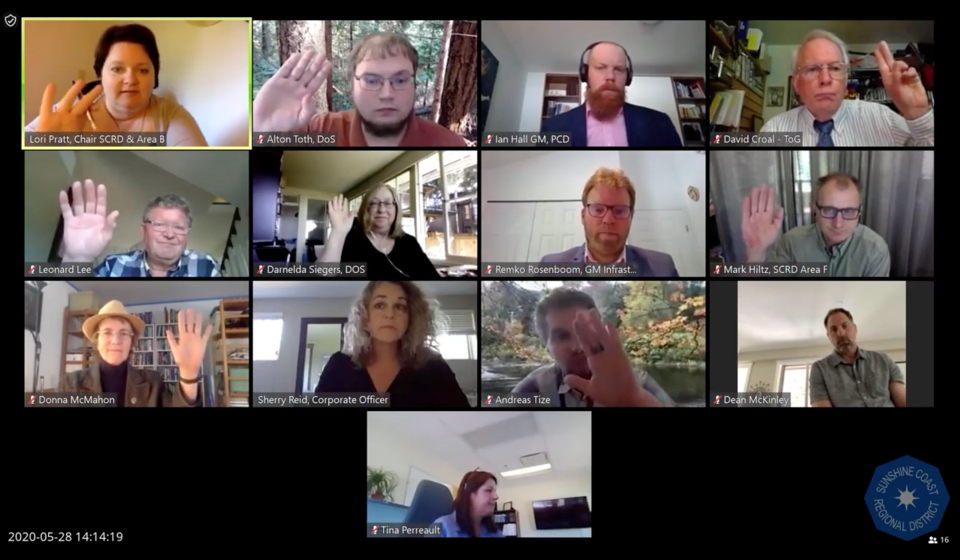Starting June 5, people will be able to weigh in about whether they object to a loan of up to $9 million to install wells in Granthams Landing that could substantially reduce the Sunshine Coast’s water shortage.
Sunshine Coast Regional District (SCRD) directors voted unanimously at a May 28 board meeting to move ahead with an alternative approval process (AAP) to approve a bylaw authorizing the long-term loan.
Chair Lori Pratt described the AAP as “great news,” especially since the province was able to approve the regional district’s request to hold the AAP “quite quickly during a very strange time.” She described the well project as a “critical piece of infrastructure for our community.”
Sechelt director Darnelda Siegers commended staff for their work on the project. “We’ve had a mandate from the community to move water projects forward. We hear it loud and clear all the time,” she said. “It’s actually staff who take that on and move those projects forward.”
Roberts Creek director Andreas Tize also threw his support behind the AAP and the project, describing it as “a much needed boost to our water supply and also much needed source of diversification.”
“It also replaces an aging well that is currently not conforming to current standards,” he said, referring to the current well in use at Granthams Landing. He added that it’s the second cheapest option to reduce the Sunshine Coast’s water shortage, after reducing the environmental flow rate at Chapman Creek.
Staff calculated there to be 19,600 eligible voters in the Regional Water system. To defeat the AAP, 1,960 response forms, or 10 per cent of eligible voters, would have to be submitted to the SCRD.
A longstanding issue around voting transparency was raised by Area A director Mark Hiltz at the meeting. “As this project seems to fall under the Comprehensive Regional Water Plan, I question why Pender Harbour would have a say in this AAP when they will not be paying for it,” he said. He asked that it be made clear in electoral form packages that Area A residents will be voting even though they won’t be paying for the loan.
Corporate officer Sherry Reid acknowledged “it is a bit odd” and said the issue repeatedly comes up and “numerous” discussions have been had with the province about this.
She said the way the water supply and distribution area service establishing bylaw was initially written, it included all electoral areas and the District of Sechelt, and that’s what determines who the eligible voters are.
Hiltz asked whether the board was able to decide on the AAP area boundaries, since he had received responses from the public on a previous AAP that by including Pender Harbour, the 10 per cent threshold is harder to achieve. “It just doesn’t quite seem to make sense… I feel there is a transparency and accountability to the people who are paying to know how this is working,” he said.
Reid said that information could be included in their communications process, and added, “We have no ability to change that unless we were to backtrack and go back to the initial service establishing bylaw and take it apart.”
AAPs are a form of electoral approval required for long-term borrowing authorization bylaws. Unlike a referendum where all eligible constituents vote, only those who object are required to submit an electoral response form.
In this case, District of Sechelt and Areas A, B, D, E and F residents are eligible to vote.
Electoral response forms can be submitted to the Field Road office beginning June 5 until July 20 at 4:30 p.m. – an extension from the traditional 30-day window AAPs are normally given, because of COVID-19.
Also because of the pandemic, information packages will be accessible online through the SCRD’s website and at 1975 Field Rd., and “enhanced communication efforts” will be taken to engage voters, according to the staff report.
People will still be required to drop off their forms at the Field Road offices during regular office hours, even though the office does remain closed. Reid said a station will be set up outside the main office doors. “I will also be available at the Field Road office should anybody show up and have any questions,” she said.
The loan would have a term of 30 years.
If the AAP fails, the SCRD has 80 days to decide whether to move ahead with a referendum. Directors will also still be able to pursue grants.



